Ought To Grammar
Published by Buds of Wisdom I am Meena Kumari, PGT(English) Bed Teaching is my passion Love to guide students in Grammar Learning and build up their writing skills.

Ought to grammar. Ought Meaning Oughtexpresses duty, necessity, desirability and similar ideas It is often used to advise people to tell them that they have a duty to do things The meaning is similar to should. CONTRACTED NEGATIVE ‘oughtn’t’ (without ‘to’) verb Point 235 ‘ought’ subject ‘not to’ verb to form (rhetorical) questions, often in formal contexts *Point 35 in the category of QUESTIONS yes/no is also C2 with uncontracted ‘not’ to emphasise a point in an argument ought not to *. From English Grammar Today Ought to is a semimodal verb because it is in some ways like a modal verb and in some ways like a main verb For example, unlike modal verbs, it is followed by to, but like modal verbs, it does not change form for person I ought to phone my parents It ought to be easy now.
The verbs or expressions dare, ought to, had better, and need not behave like modal auxiliaries to a large extent and my be added to the above list Use of modal verbs Modal verbs are used to express functions such as. Ought to means a suggestion You should do something but you don't have to do it We ought to clean the house tonight Phillip ought to help you with your homework (Notice that all of these words are modals They are followed by a verb) *** You may feel confused about the slight differences between these words. Oughtis a modal auxiliary verb There is no s in the third person singular She ought to understand (NOT She oughts to ) Ought is different from other auxiliary verbs It is used with to We ought torespect our parents We ought to help the poor Note that to is dropped in question tags.
2) Should and ought to Should and ought to are basically the same, although should is much more widely used than ought to The negative and interrogative forms of ought to are becoming increasingly rare Both should and ought to are used to talk about obligation and duty and to give advice. I ought not to have done it, not I hadn't ought to have done it Collins English Dictionary. Learn how to use 'should', 'ought to', 'supposed to' and 'had better' in this video lesson You'll see what these verbs mean and how to use them Get more pr.
The modal verb ought to expresses weaker obligation or advice It can be considered to not be as strong as must We can use it in its different forms Affirmative We start with the subject followed by ought to and the verb Negative We start with the subject followed by ought not to and the verb Interrogative We start with ought followed by the subject and to and the verb (the sentence ends with a question mark). You ought to have told me !. Should have past participle talks about past events, actions that did not happen but it would be better if they had happened A mistake or regret is implied For Example You should (ought to) have checked your report thoroughly before you handed it in.
Ought to has the same meaning as should, although it is more formal and not as common You ought to go to a therapist You ought not to be so strict with your daughter. Modal verbs part 2 obligation must, have to, should and ought to those that primarily express a firm obligation or necessity must and have to those that express a recommendation or moral obligation should and ought to. Exercise on how to use should and ought to for strong probability Substitute the phrase underlined for the should / shouldn't or ought to / oughtn't to structures (both modals are possible in all answers even though there may be small differences in meaning).
Ought to Easy Learning Grammar The use of ought to is similar to should, but it is much less frequent Like should, the verb ought to does not have a past form It is only used with reference to the present and the future Ought to is rarely used in questions and negatives. Ought is usually followed by ‘to’ and an infinitive You ought to tell the truth Sometimes it is used without ‘to’ or a following infinitive in a formal way I don’t practise as often as I ought It is also used in an informal way followed by ‘to’ but no following infinitive I don’t spend as much time with them as I ought to. 2 phrase You use ought to when saying that you think it is a good idea and important for you or someone else to do a particular thing, especially when giving or asking for advice or opinions You don't have to be alone with him and I don't think you ought to be You ought to ask a lawyer's advice.
Grammar Point should / ought / had better should / ought / had better Should and ought to are both used to say that something is the best thing or the right thing to do, but should is much more common You should take the baby to the doctor’s I ought to give up smoking In questions, should is usually used instead of ought to Should we call the doctor?. Shall we begin the meeting now?. Must = used for strong advice, obligation, and rules should = used for give advice (not as strong as the words above) Had better is used to give strong advice However, had better is only used when there is the threat (risk) of danger if you do not follow the advice Here are some examples.
Ought to talk It's raining and I don't want to get my dress wet I _________________ an umbrella had better not bring had better to bring had better bring The airline only allows two pieces of luggage You _________________ pack too much or you will have to take it out at the airport!. And, as you had probably seen, Do I ought is not even found by Google Ngrams The verb ought is a modal verb and this means that, grammatically, it does not behave like ordinary verbs In particular, the negative is formed with the word not alone and not also with auxiliary verbs such as do or have. GRAMMAR WORKSHEET OUGHT TO question Complete the sentences below by using ‘ought to’ to give advice 1 A I feel cold B You ought to _____ 2 A Jack doesn’t like his job B He ought to _____ 3 A Our plane will take off in five minutes.
A1) You should stop smoking ( = You ought to stop smoking) a2) It's raining hard, the children ought to come indoors a3) I didn't know you were married !. Ought auxiliary verb (used with to) Example He ought to help his staff at night. A modal verb is a type of auxiliary (helping) verb that has no meaning on its own but it modifies the main verb, changes its meaning and gives more details about the action Ought to is a type of auxiliary modal verb used to express obligation and duty through advice or recommendations.
CONTRACTED NEGATIVE ‘oughtn’t’ (without ‘to’) verb Point 235 ‘ought’ subject ‘not to’ verb to form (rhetorical) questions, often in formal contexts *Point 35 in the category of QUESTIONS yes/no is also C2 with uncontracted ‘not’ to emphasise a point in an argument ought not to *. 'Ought to' often has a somewhat sarcastic or even chastising tone to it in modern American English whereas 'should' carries less tone and therefore is more often used "Mike ought to check his oil" is mostly used when the speaker is implying that Mike isn't going to check the oil or that he should have already. The modal verbs should and ought to express weaker obligation or advice They are always followed by the infinitive They differ in usage despite both having similar meanings Should is used more often and is less formal.
Should is a modal verb After Should you use the base form of the infinitive (= verb without To eg Go instead of To Go) Should Verb (base form of infinitive) eg You should go now ( do not say You should to go now). The verbs or expressions dare, ought to, had better, and need not behave like modal auxiliaries to a large extent and my be added to the above list Use of modal verbs Modal verbs are used to express functions such as. Ought not to * 1 ought not to be 4793 2 ought not to have 1055 3 ought not to do 297 4 ought not to take 126 5 ought not to make 104 6 ought not to go 76 7 ought not to think 76 8 ought not to say 71 9 ought not to give 68 10 ought not to expect 59 11 ought not to forget 59 12 ought not to use 52 13 ought not to exist 51 14 ought not to believe 45.
Uses of ought Ought expresses ideas such as duty, necessity and moral obligation It is not as forceful as must, but it is stronger than should You ought to be punctual We ought to help the poor You ought to visit your friends once in a while Ought generally points to present and future time It can point to past time when it is followed by the perfect infinitive (have past participle). 6) The door should have opened / The door ought to have opened 7) Johnny should have eaten his vegetables / Johnny ought to have eaten 8) The phone should have rung / The phone ought to have rung 9) They should have won the match / They ought to have won 10) The teacher should have helped him / The teacher ought to have helped. źródło English Grammar Today Ought to is a semimodal verb because it is in some ways like a modal verb and in some ways like a main verb For example, unlike modal verbs, it is followed by to, but like modal verbs, it does not change form for person I ought to phone my parents.
Should (Ought to) Have Done (V3) Should have past participle talks about past events, actions that did not happen but it would be better if they had happened A mistake or regret is implied For Example You should (ought to) have checked your report thoroughly before you handed it in. Should and ought to are basically the same, although should is much more widely used than ought to The negative and interrogative forms of ought to are becoming increasingly rare Both should and ought to are used to talk about obligation and duty and to give advice. / John ought to have done 2) She should have telephoned her mother yesterday / She ought to have telephoned 3) They should have been at home by eleven o'clock / They ought to have been 4) The bus should have stopped / The bus ought to have stopped 5) He should have found the time to do the shopping / He ought to have found.
GRAMMAR WORKSHEET ALL Things Grammar Grammar Focus Ought to Level Intermediate ANSWER KEY My Notes Answers will vary Grades as percentages 8 / 8 = 100% 7 / 8 = 6 / 8 = 75 5 / 8 = 63 4 / 8 = 50 3 / 8 = 38 2 / 8 = 25 1 / 8 = 13 0 / 8 = 0% Permission granted to reproduce for classroom use. Should and ought have similar meanings They are both used to talk about obligation, and to give advice or instructions We should respect our parents We ought to respect our parents You should stop smoking You ought to stop smoking Must is stronger than should and ought You must stop smoking (A command) You should/ought to stop smoking. A mind map of GIVING ADVICE Should, ought to, had better, must/have to, advise/would advise, why don't you, may/might as well, it's (hi.
Ought to Advice Logical deduction You ought to write to your grandmother 30 € ought to be enough for the taxi Shall Future tense auxiliary Offers/suggestions with ''I' and 'we' I shall be in London on Monday (or I'll be ) Shall I order a taxi?. In English grammar, SHOULD is a modal Modals give a special meaning to a verb, and they are always followed by the BARE INFINITIVE form of the verb, in other words, the infinitive WITHOUT “TO” So, for example, it is wrong to say ‘ I should to learn English’ , and it is correct to say ‘ I should learn English ’. Ought to have (done something) Definitions and Synonyms ought to have (done something) phrase DEFINITIONS 1 1 used when you realize that someone did not do the right thing in the past You ought to have listened to the warnings I know I ought not to have taken the money.
Ought to have (done something) Definitions and Synonyms ought to have (done something) phrase DEFINITIONS 1 1 used when you realize that someone did not do the right thing in the past You ought to have listened to the warnings I know I ought not to have taken the money. Grammar explanation at level Free Practice Tests for learners of English Advertisements. Ought to – should is used to give advice or opinion and one can choose to follow or ignore it, whereas ought to is used when the advice has to be followed While should and ought to are used interchangeably, ought to is a stronger word compared to should and is more appropriate to use while talking about rules, regulations and laws.
Ought to is very uncommon in everyday use, especially in its negative and interrogative form, and is generally more formal For example — “ You should apologise ” / “ You ought to apologise ” = Should and ought to have similar meaning. Ought to Easy Learning Grammar The use of ought to is similar to should, but it is much less frequent Like should, the verb ought to does not have a past form It is only used with reference to the present and the future Ought to is rarely used in questions and negatives. 1 “Ought” can indicate correctness or duty, often when criticizing the actions of another She ought to slow down so she doesn’t get a ticket 2 “Ought” can indicate that something is probable Three minutes ought to be long enough A lot of English learners struggle to use the word “ought”.
Ought to is similar in meaning to should, but it is not used as often In modern American English, ought to is seldom used with the past tense or in the question form Using had better. It sounds better because ought is a semantic modal auxiliary and omission of the to (ie, treating the infinitive complement as a modal would and omitting to) is a negative polarity phenomenon, like the use of need and dare as modals *I need go ~ I need not go (modal) I need to go ~ I don't need to go. Auxiliary verb (used to express duty or moral obligation) Every citizen ought to help (used to express justice, moral rightness, or the like) He ought to be punished You ought to be ashamed (used to express propriety, appropriateness, etc) You ought to be home early We ought to bring her some flowers.
Ought To "Ought to" is used to advise or make recommendations "Ought to" also expresses assumption or expectation as well as strong probability, often with the idea that something is deserved "Ought not" (without "to") is used to advise against doing something, although Americans prefer the less formal forms "should not" or "had better not" Examples. To express a desire or wish on the part of the speaker you ought to come next week USAGE In correct English, ought is not used with did or had I ought not to do it, not I didn't ought to do it;. A4) If you'd wanted to succeed, you should have worked harder at school a5) This pullover's got holes in it, I should get a new one.
Ought is used with meanings similar to those of should expressing expectation or requirement The principal grammatical difference is that ought is used with the to infinitive rather than the bare infinitive, hence we should go is equivalent to we ought to go. English speakers use the modal verbs “should,” “ought to” and “had better” to express that they think something is a good (or a bad) idea “Should” is the most common way to give advice Look at these examples Affirmative Negative Question. Play this game to review Grammar In the Netherlands children wear a school uniform.
English speakers use the modal verbs “should,” “ought to” and “had better” to express that they think something is a good (or a bad) idea “Should” is the most common way to give advice Look at these examples Affirmative Negative. Grammar should / ought to / had better Should and ought to are both used to say that something is the best thing or the right thing to do, but should is much more common You should take the baby to the doctor’s I ought to give up smoking In questions, should is usually used instead of ought to Should we call the doctor?. Should, Ought to, Had Better ID 2943 Language English School subject English as a Second Language (ESL) Grade/level Preintermediate Age 9 Main content Grammar Other contents Add to my workbooks (70) Download file pdf Embed in my website or blog Add to Google Classroom Add to Microsoft Teams Share through Whatsapp.
The verbs or expressions dare, ought to, had better, and need not behave like modal auxiliaries to a large extent and my be added to the above list Use of modal verbs Modal verbs are used to express functions such as Permission ;. You ought not (to) speak with your mouth full You should not speak with your mouth full Used less frequently than should, ought is always followed by a verb in the infinitive with to, except in the negative form, where we don't need to add to You ought not (to) ask so many questions. Will Future tense auxiliary Invitations/offers.
A mind map of GIVING ADVICE Should, ought to, had better, must/have to, advise/would advise, why don't you, may/might as well, it's (hi. Should, Ought to, Had Better ID 2943 Language English School subject English as a Second Language (ESL) Grade/level Preintermediate Age 9 Main content Grammar Other contents Add to my workbooks (70) Download file pdf Embed in my website or blog Add to Google Classroom Add to Microsoft Teams Share through Whatsapp. Ought to is similar in meaning to should, but it is not used as often In modern American English, ought to is seldom used with the past tense or in the question form Using had better.
Grammar explanation at level Free Practice Tests for learners of English Advertisements.

263 Using Ought To English Grammar Lesson Happy English Podcast

Should Ought To Had Better Worksheet

Use Of Should Must Ought To Modal Auxiliary In English Grammar च ह ए व ल Sentence Youtube
Ought To Grammar のギャラリー

30 Modal Verbs Past Modals Ideas English Grammar Learn English English Lessons
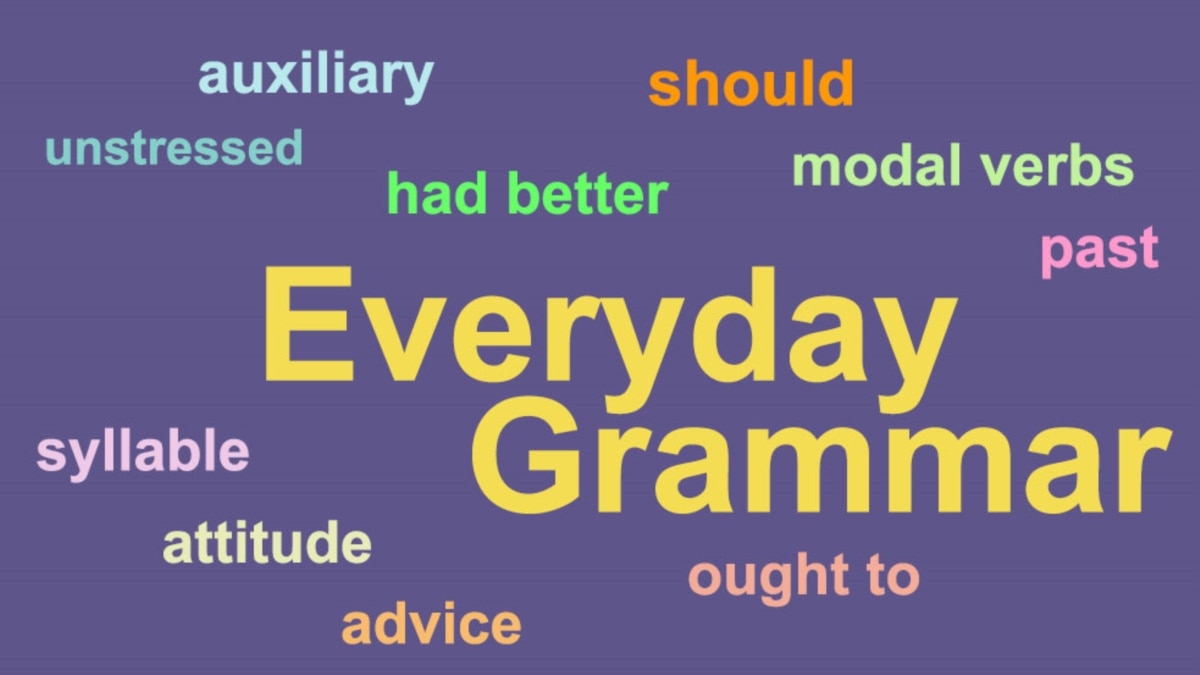
Everyday Grammar You Had Better Learn Modals

Grammar Genius 3 Student S Book By Hamilton House Elt Issuu

You Ought To Learn How To Use Modals Correctly Markesol

English Grammar Modal Verbs Globalexam Blog

How To Use Can Could May Might Will Would Must Difference Between Should Ought To Meaning Of Owe In Urdu English Grammar Lesson Ea English 2 Ea English

Using Perfect Infinitives With Modal Verbs English Grammar Eslbuzz Learning English
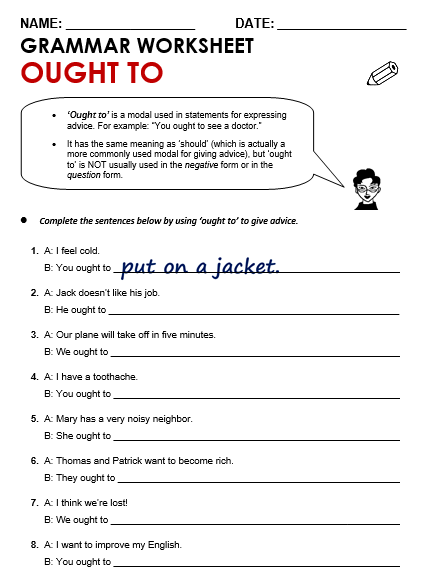
Ought To All Things Grammar
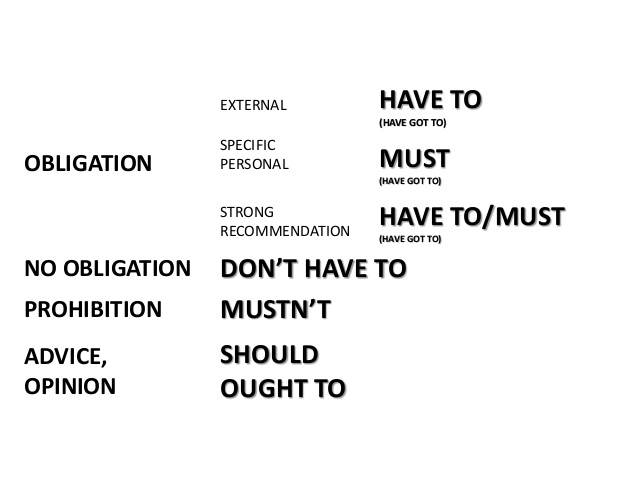
7a Advanced English Grammar Differences Between Must Have To Ought To Should Need Needn T Have

Irregular Verbs Ending With Ought English Grammar Lesson Youtube
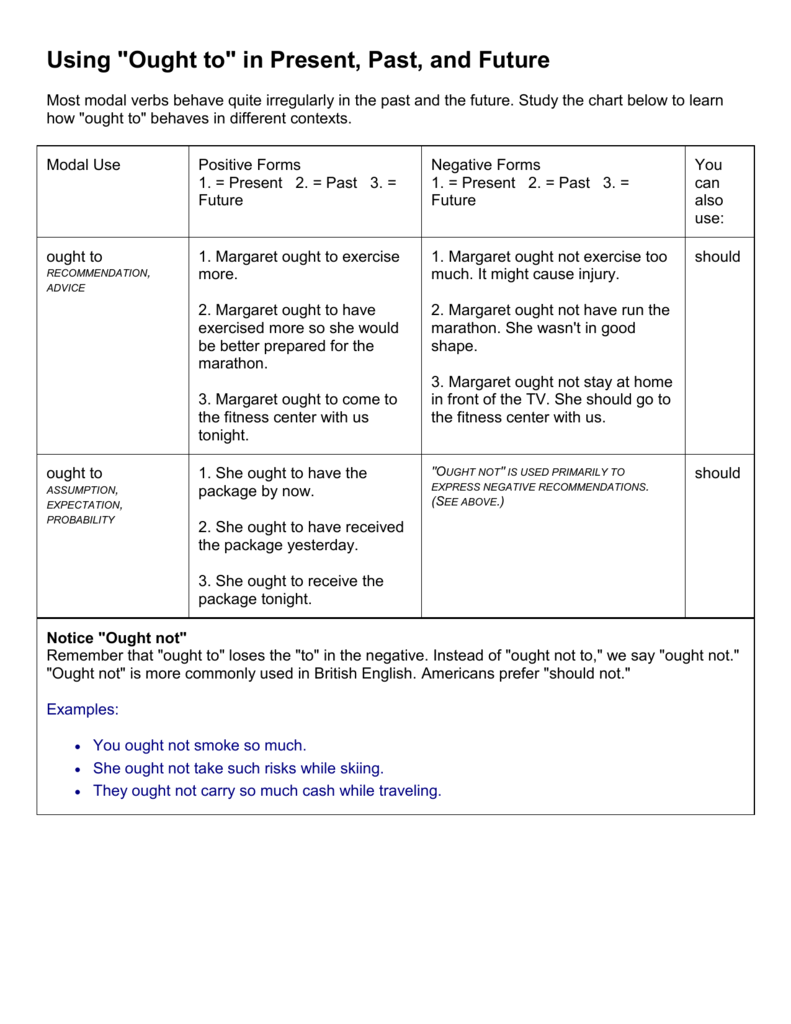
Ought To Should Have Has Must Could Grammar

Flying High For Saudi Arabia 6 Student S Book By Macmillan Education Issuu

The Basics Of Modal Verbs One Point Grammar Lesson Happy English Free English Lessons

American English At State This Week S Voa Learning English Everyday Grammar Is About Three Modal Verbs Used To Give Advice Should Ought To Had Better Check Out Our Americanenglish Graphic

Should Ought To Had Better English Grammar Teaching English Grammar English Verbs

Should And Ought To Grammar Authorstream

Pdf Lesson Plan Teaching Vocabulary Grammar Vorachet Saejea Academia Edu
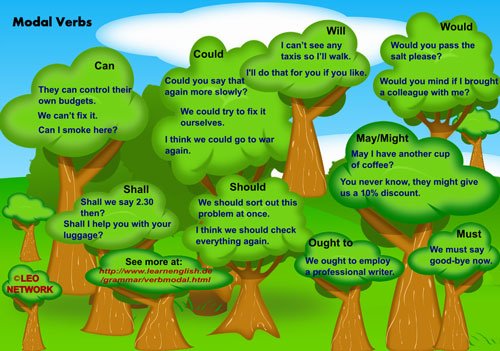
English Grammar Modal Verbs Learn English

Should Ought To Supposed To Had Better Video Oxford Online English

Should Ought To Grammar

Answers Exercise A B

Should Ought To Had Better Must Modals Verbs Of Advice Ppt Download

Petertheproofreader 𝗼𝘂𝗴𝗵𝘁 Should You 𝗼𝘂𝗴𝗵𝘁 𝘁𝗼 Exercise You 𝗼𝘂𝗴𝗵𝘁 Exercise 𝗼𝘂𝗴𝗵𝘁 𝗻𝗼𝘁 Should Not You 𝗼𝘂𝗴𝗵𝘁 𝗻𝗼𝘁 𝘁𝗼 Smoke You 𝗼𝘂𝗴𝗵𝘁 𝗻𝗼𝘁
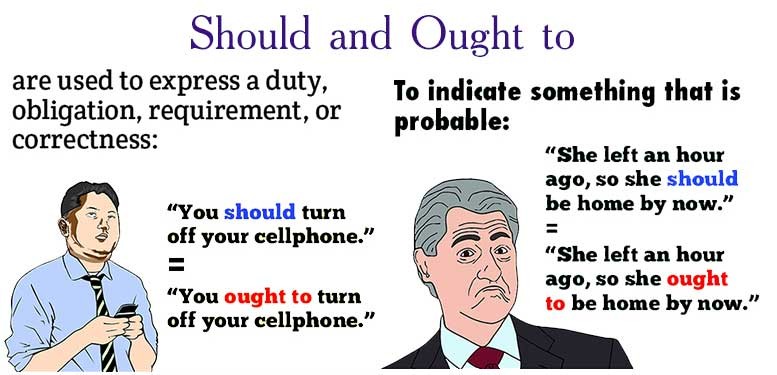
Should I Ought To Uprazhneniya Exercises Grammar Tei Com

Grammar Atlantis Idiomas Y Formacion

Use Of Ought To Modal Verbs English Grammar Youtube
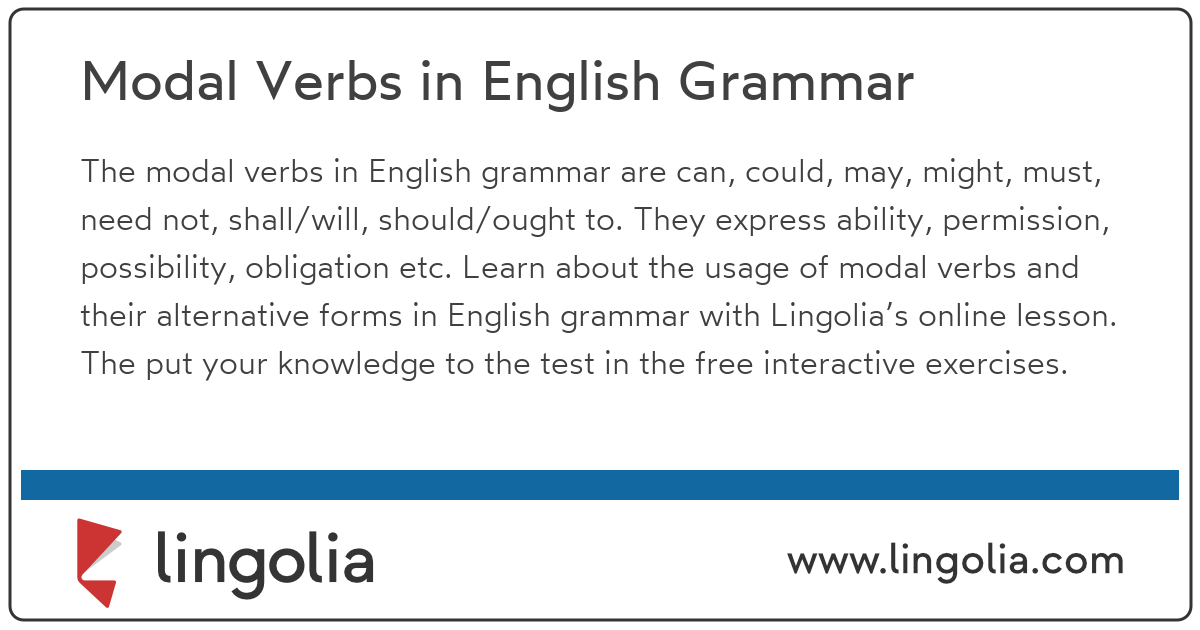
Modal Verbs In English Grammar

Modal Verbs Should Ought To Have To Y Must

How To Use Can Could May Might Will Would Must Difference Between Should Ought To Meaning Of Owe In Urdu English Grammar Lesson Ea English 3 Ea English
Q Tbn And9gctzljs1trqi4ujttq Vklroiaws5thyyfowtnn9y0o Usqp Cau
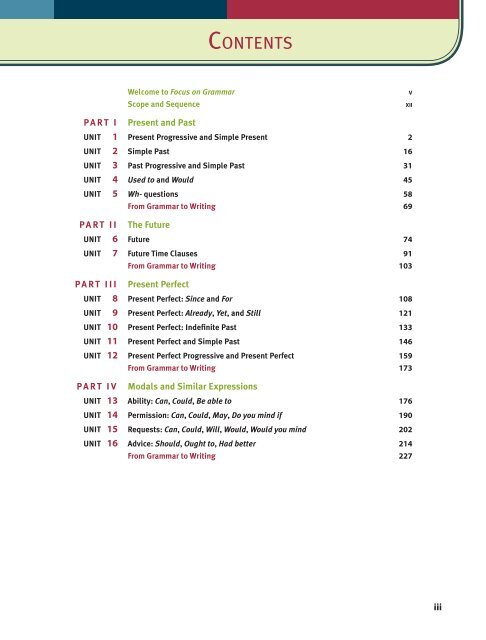
Table Of Contents Home Focus On Grammar
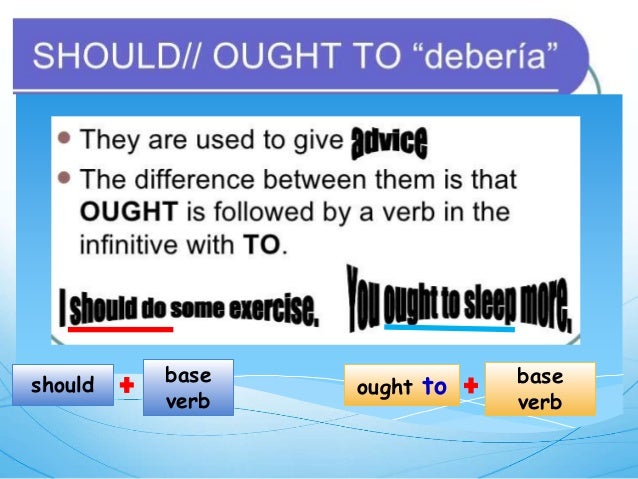
Should Ought To Grammar

Ought To Apprendreanglais Apprendreanglaisenfant Anglaisfacile Coursanglais Parleranglais Apprendreanglaisf English Grammar English Phrases English Vocabulary
What Is The Difference Between Should And Ought To Quora

Advice Should Shouldn T Ought To Had Better And Had Better Not
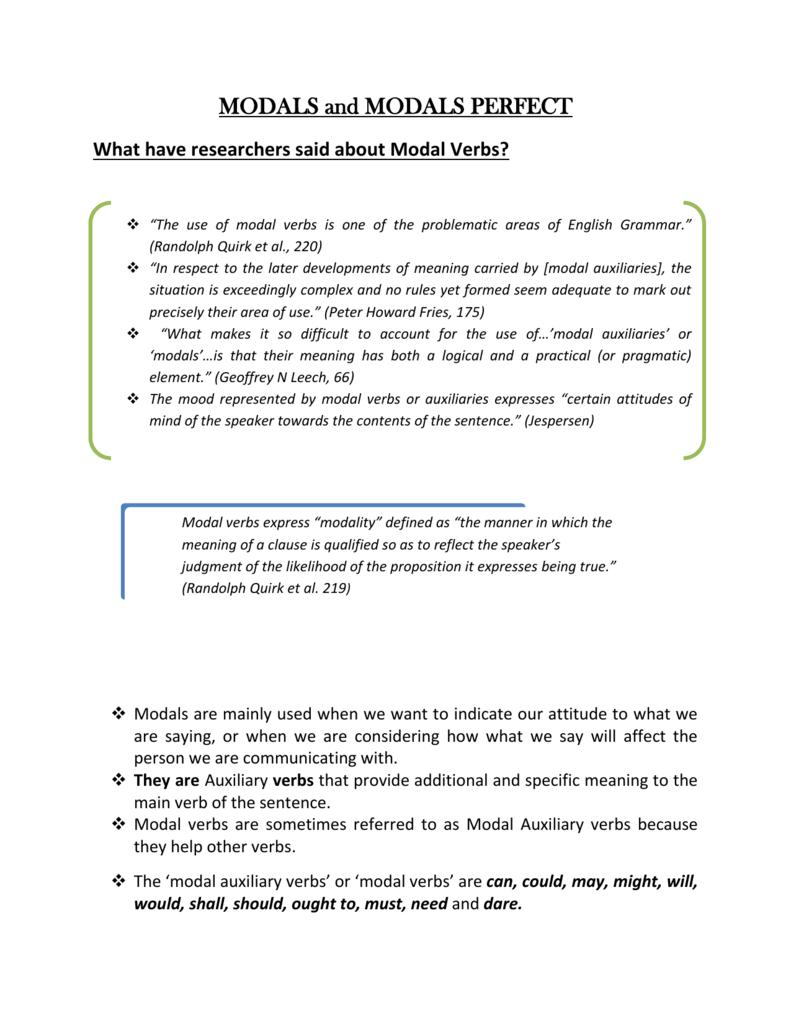
Modals Simplified
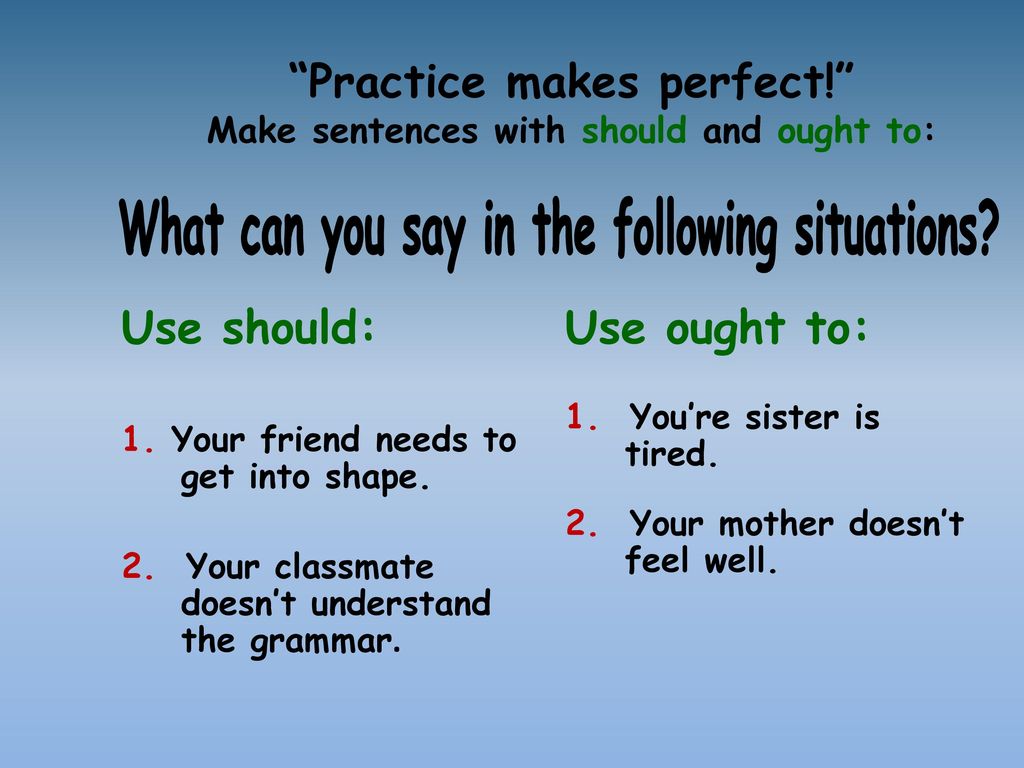
Function Giving Advice Or Suggestions In English Ppt Download

English Esl Ought To Worksheets Most Downloaded 19 Results
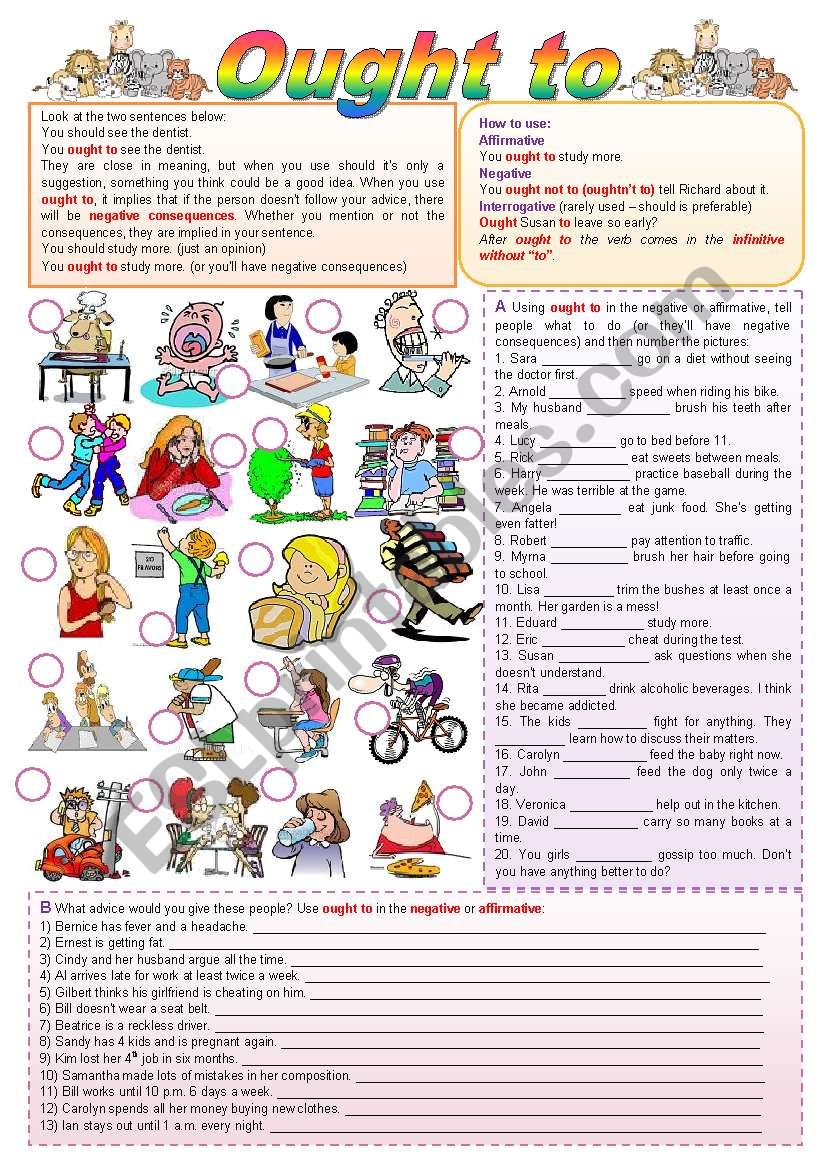
Ought To Grammar Guide Exercises Fully Editable Esl Worksheet By Zailda

Grammar 3 Ch9 Advisability Should Ought To And Had Better Youtube
:max_bytes(150000):strip_icc()/Getty_marginal_modal-185278342-57d74e835f9b589b0a9fb280.jpg)
Definition And Examples Of Marginal Modals In English

Show Your By Subscribing Our Youtube English Grammar General Knowledge Facebook
What Is The Difference Between Should And Ought To Quora
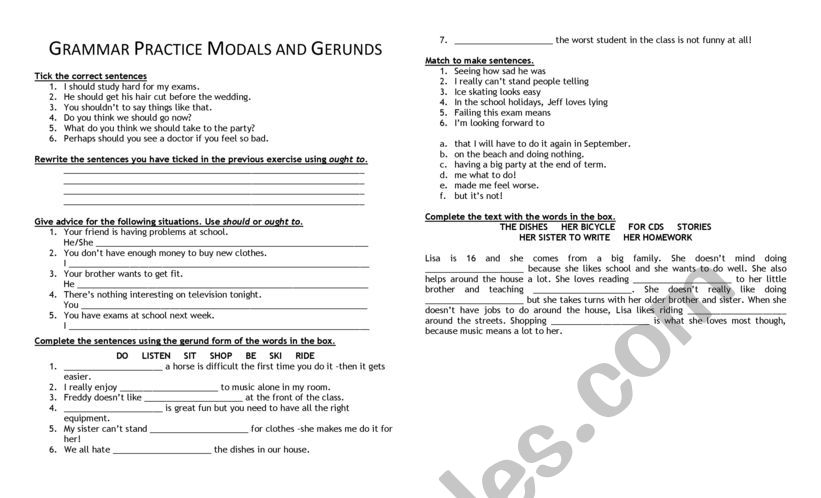
Grammar Practice For Modals Should Ought To And Gerunds Esl Worksheet By 84leandrin

The Yuniversity Yo Grammar What S Up With Ought To And

ثمرات اللغة Language Thamarat Modal Verbs I Can Could May Might Must Need To Have To Should Ought To Had Better

Using The Expression Ought To In English Modal Auxiliary Verb Video Lecture By Prof Rachna Of Other Providers

What Are Modals English Grammar Ielts Exam Ielts Fever

Modal Verbs Useful Rules List And Examples In English Esl Grammar

Difference Between Ought To And Should Myenglishteacher Eu Blog

Grammar Giving Advice Should Ought To Had Better Youtube

Unit 1 Grammar 1 Interactive Worksheet

Grammar Extra Inspired 3 Unit 3 Modal Verbs Should Ought To Shouldnt
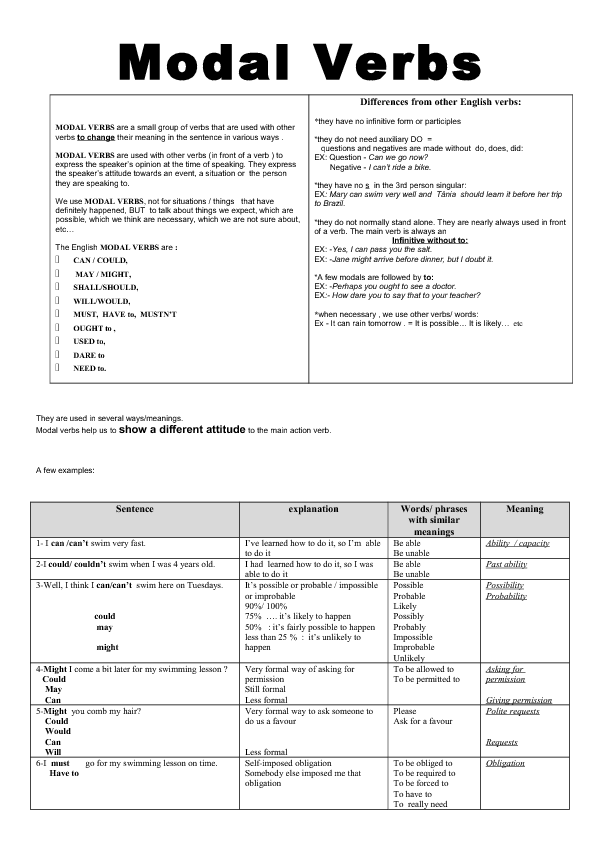
Modal Verbs Grammar Guide And Exercises
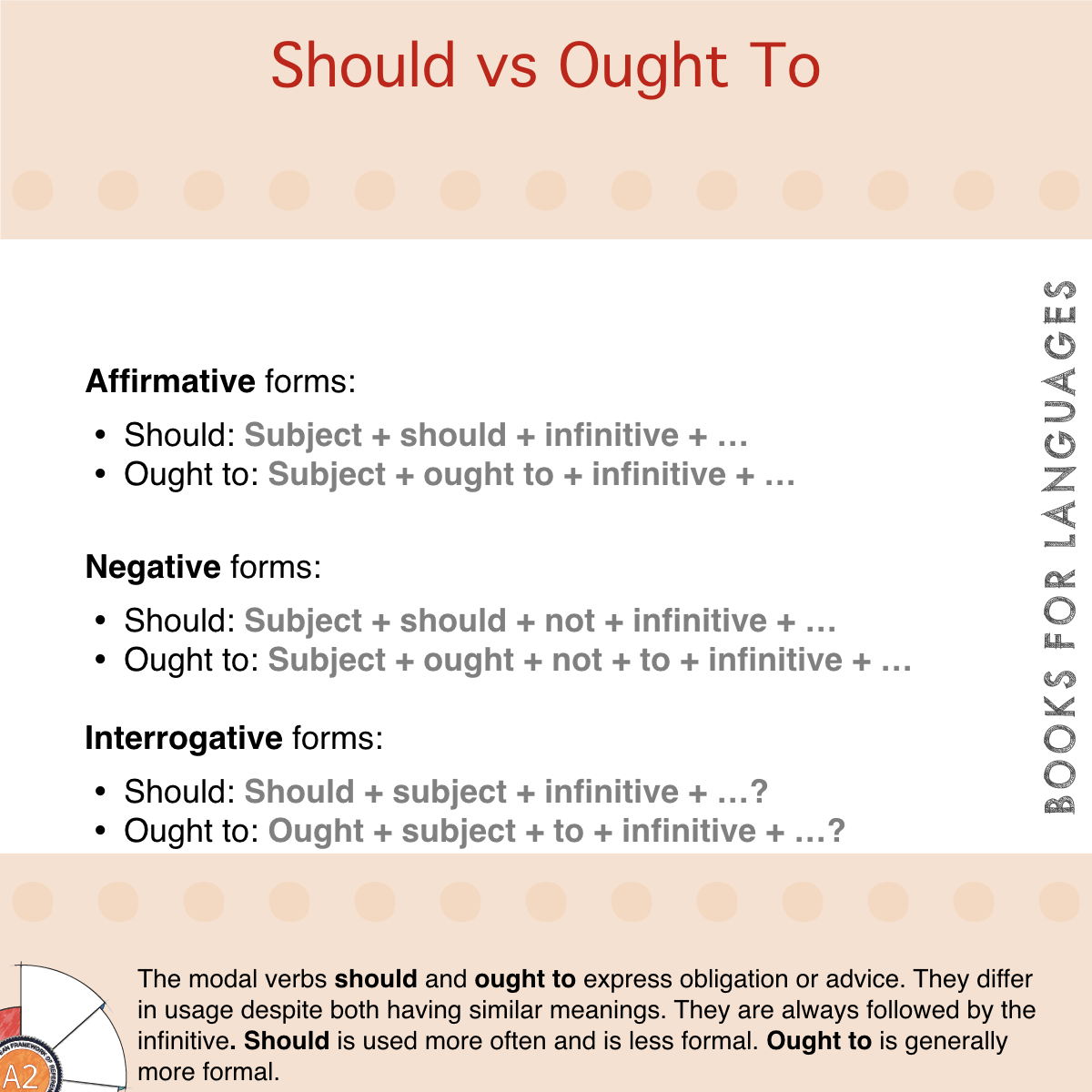
Should Vs Ought To English Grammar Level
3
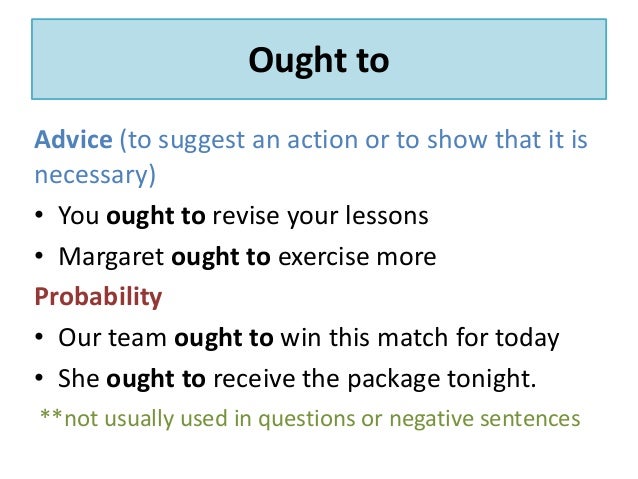
Modals Markesol
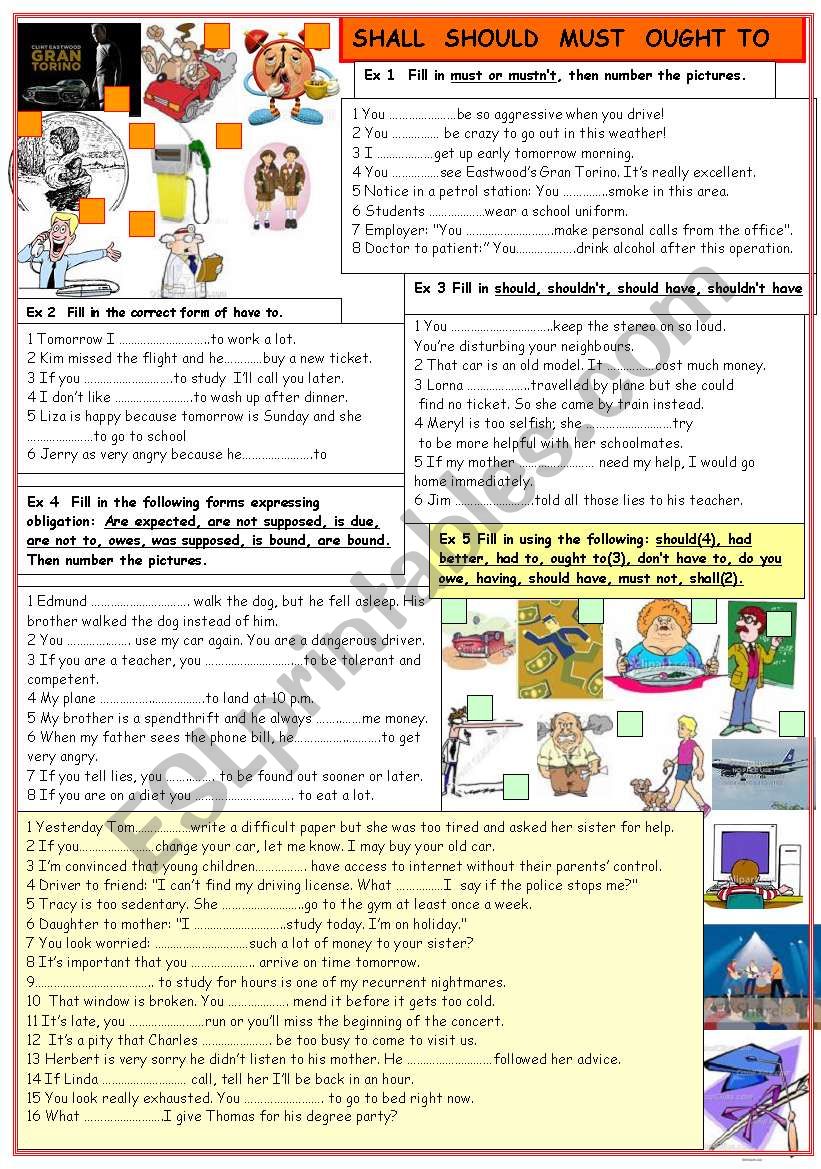
Shall Should Ought To Must Esl Worksheet By Lilianarota
Q Tbn And9gcqgg1ru3welvscv8kc3k58alaxodiwkpuvbtonynsq5ye2vo Cw Usqp Cau
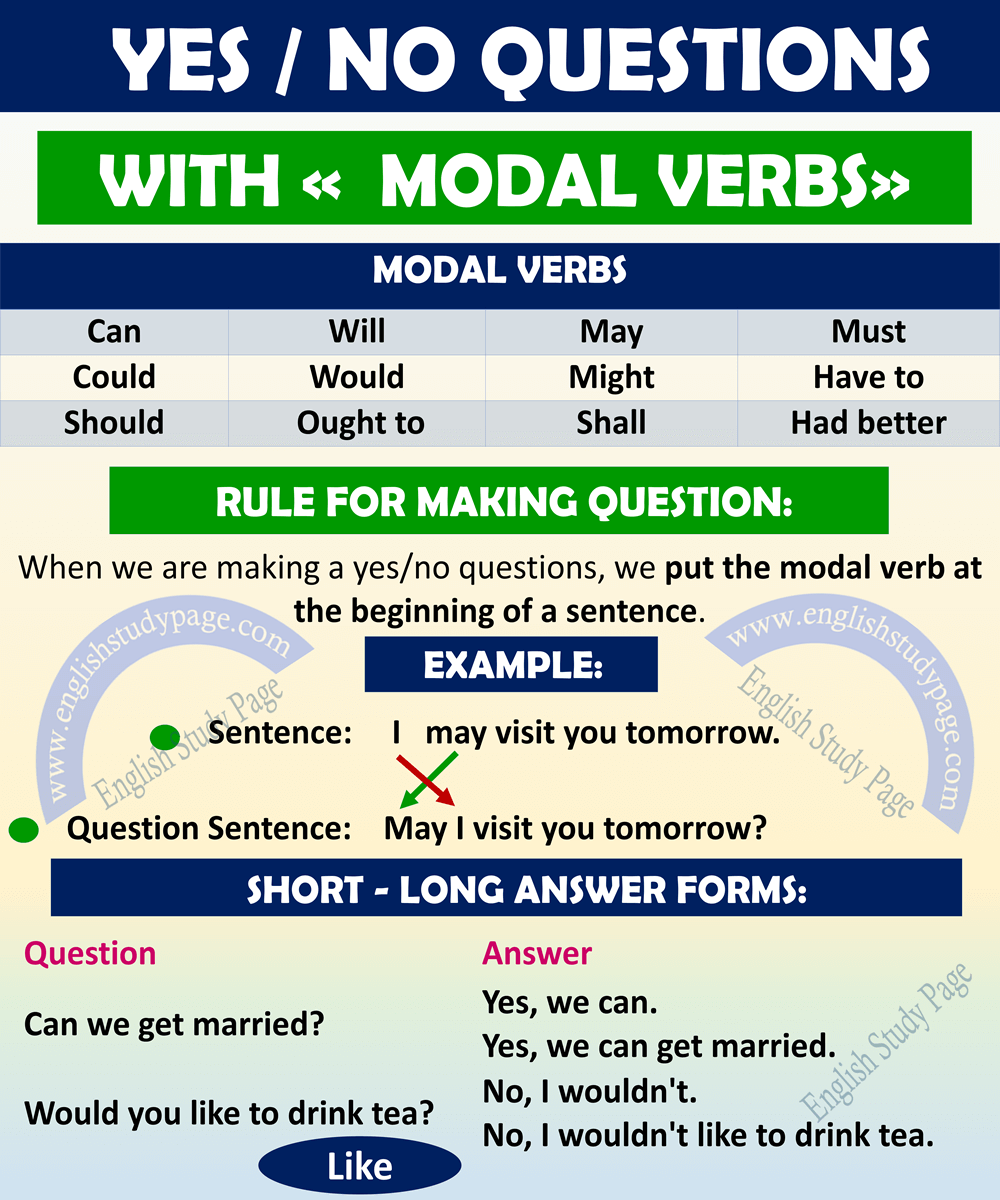
Yes No Questions With Modal Verbs English Study Page

Ought To All Things Grammar
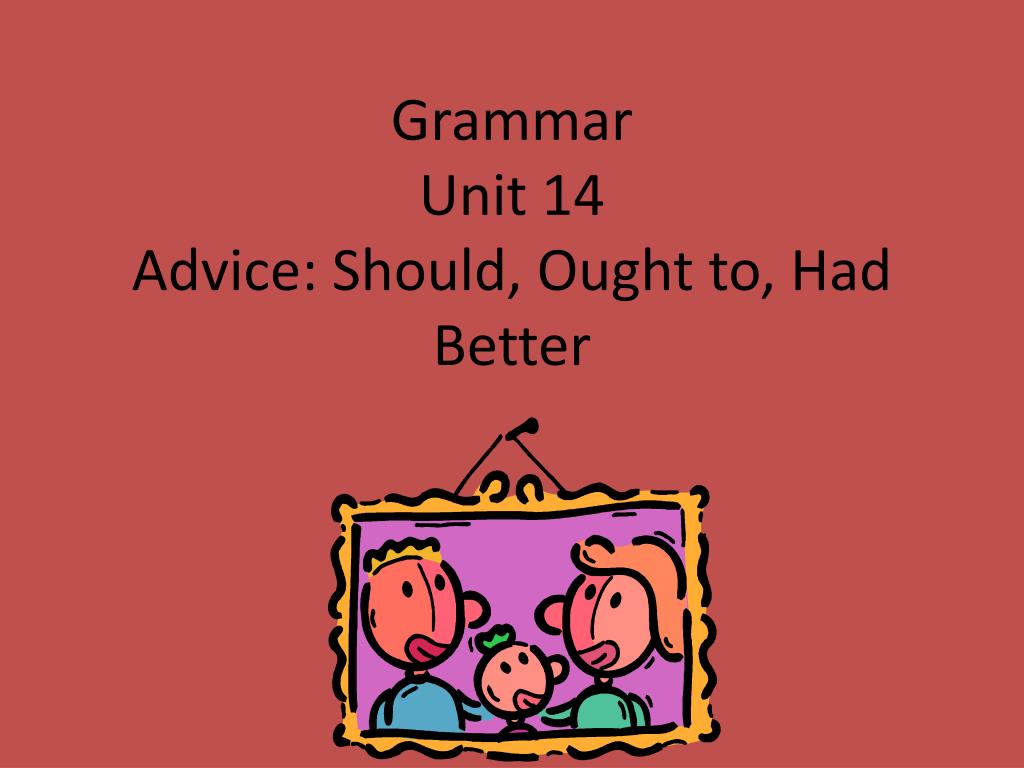
Ppt Grammar Unit 14 Advice Should Ought To Had Better Powerpoint Presentation Id

Modal Verbs Modal Verbs English Grammar Learn English Verb Verbs English Language

Modal Auxiliaries Should Ought To Might Could عين دروس Grammar Mega Goal1 أول ثانوي المنهج السعودي
1
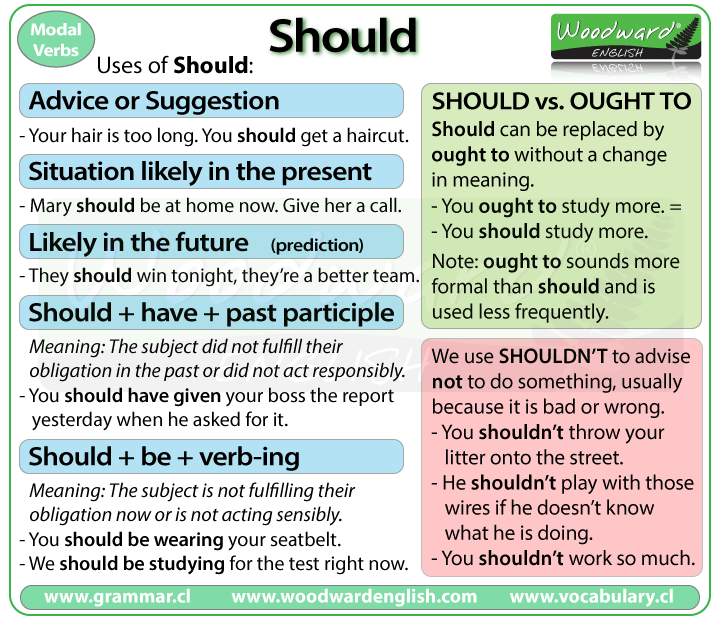
Should English Modal Verb Woodward English

English Grammar Modal Verbs Worksheets English Worksheets Go Math Workbook Grade 3 Math For 4 Year Olds Worksheet Money Multiplication Word Problems Math In Hindi Coloring Worksheets For Grade 3 Printable Worksheets For Kids

Test English Prepare For Your English Exam

21

Using The Expression Ought To In English Modal Auxiliary Verb English Grammar Lesson Youtube

Eage Spoken English Learn English English Grammar English Idioms
Indispensability Of To After Ought In British English English Language Usage Stack Exchange

Grammar My Rosetta Stone

Should Ought To Had Better English Esl Worksheets For Distance Learning And Physical Classrooms
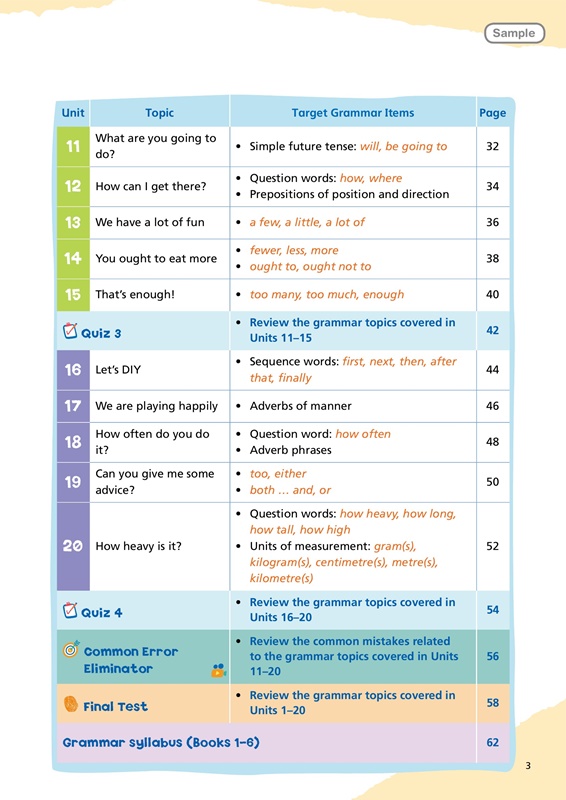
Supp Eng Gd P4 1

English Esl Ought To Worksheets Most Downloaded 19 Results

Confusing Verbs 3 Would Rather Had Better Kse

Rbse Class 10 English Grammar Modals

Modal Verbs Useful Rules List And Examples In English Esl Grammar

Should Vs Ought To Main Verbs Grammar Teaching Grammar

Understanding Modal Verbs Part 2 Elementary Grammar

When To Use Should Or Ought To English Grammar Woodward English English Verbs

Modal Verbs Should And Ought To English Esl Worksheets For Distance Learning And Physical Classrooms

When To Use Should Ought To An English Grammar Video Youtube

Advanced Grammar Unit Modalnye Glagoly Should I Ought Freestudio21
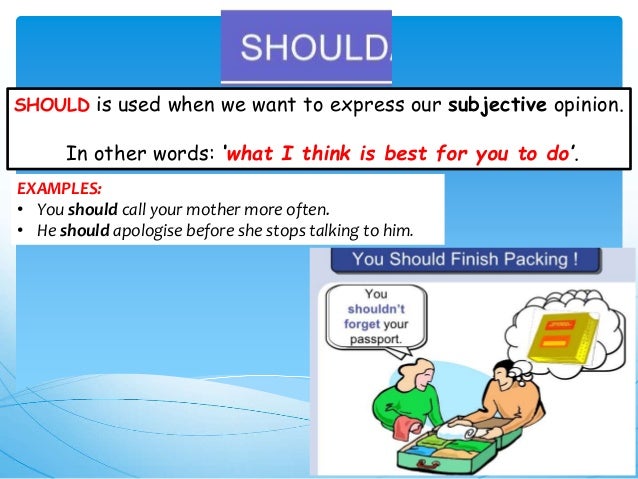
Should Ought To Grammar

Modals Should Ought To And Had Better English Grammar Practice Ea Learning English

Should English Grammar
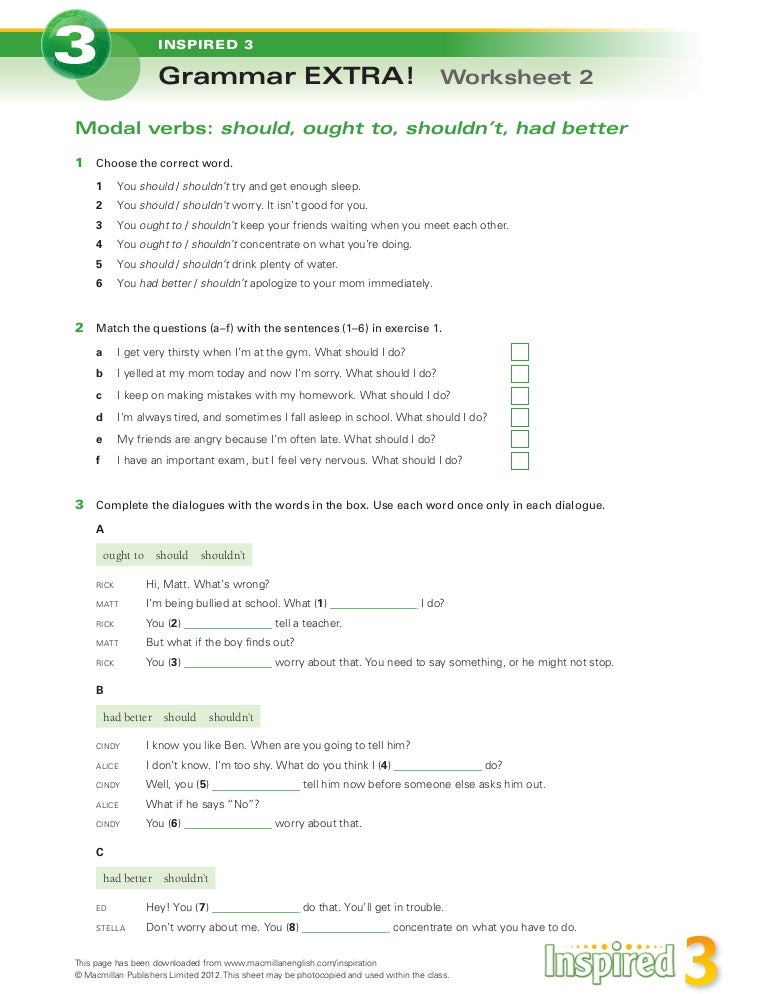
Grammar Extra Inspired 3 Unit 3 Modal Verbs Should Ought To Shouldnt

Modal Verbs Should Ought To Have To Y Must
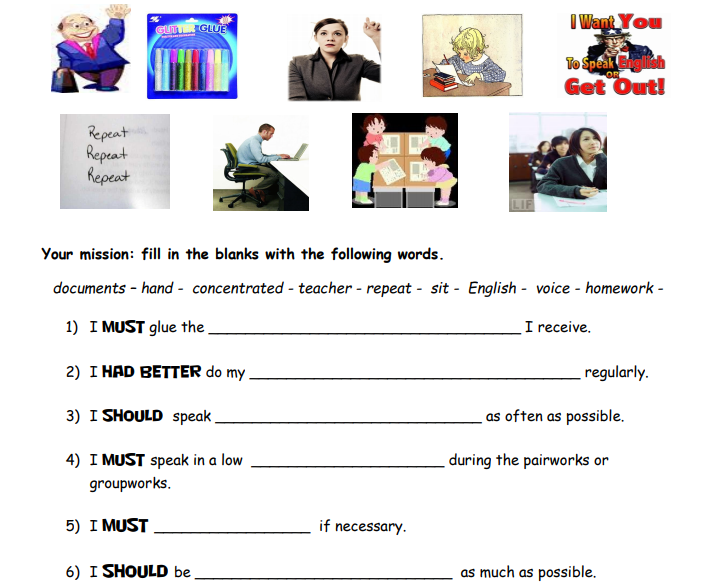
81 Free Must Worksheets
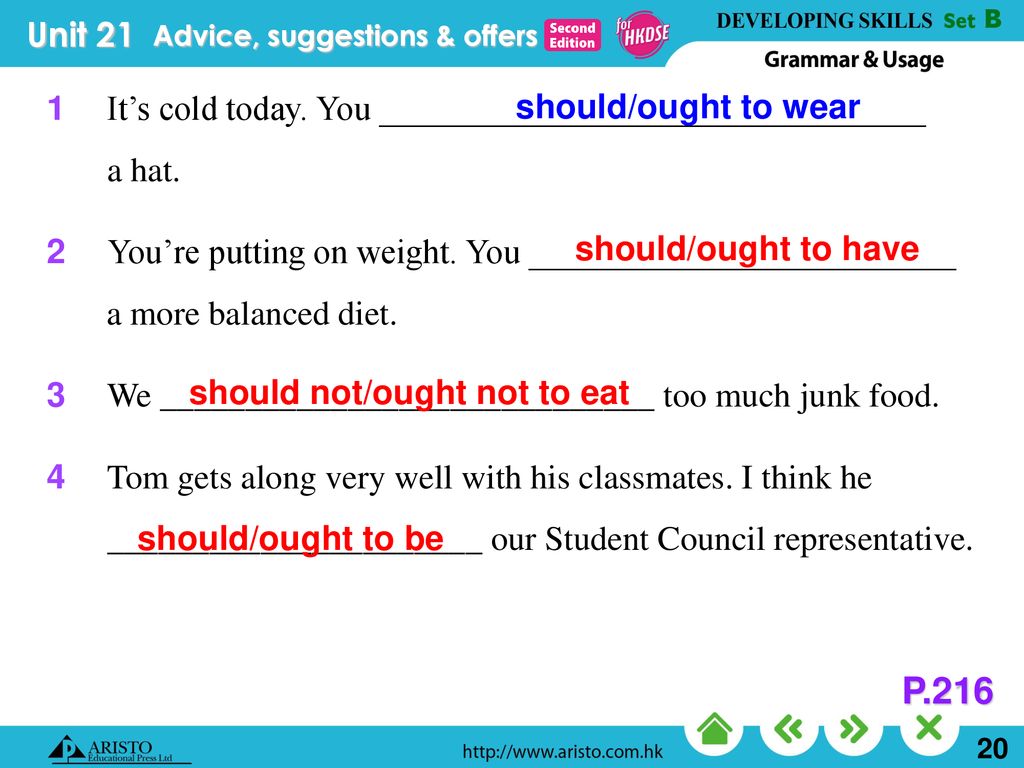
21 1 Should And Ought To Had Better Bare Infinitive Ppt Download

Angel For English Chapter 39 English Grammar In Gujarati Should Ought To Modal Auxiliary Verb

Should English Grammar

مواضيع لتعلم اللغة الانجليزية مفيدة للجميع Modal Verbs I Can Could May Might Must Need To Have To Should Ought To Had Verb He Is Able I Can
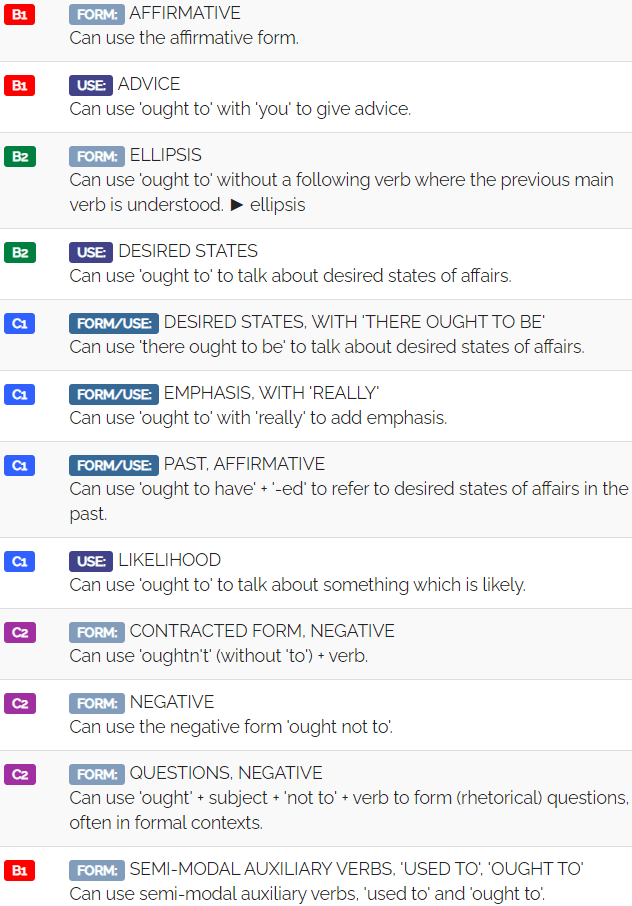
Ought Semi Modal English Grammar Pro

Ought To Brain Perks
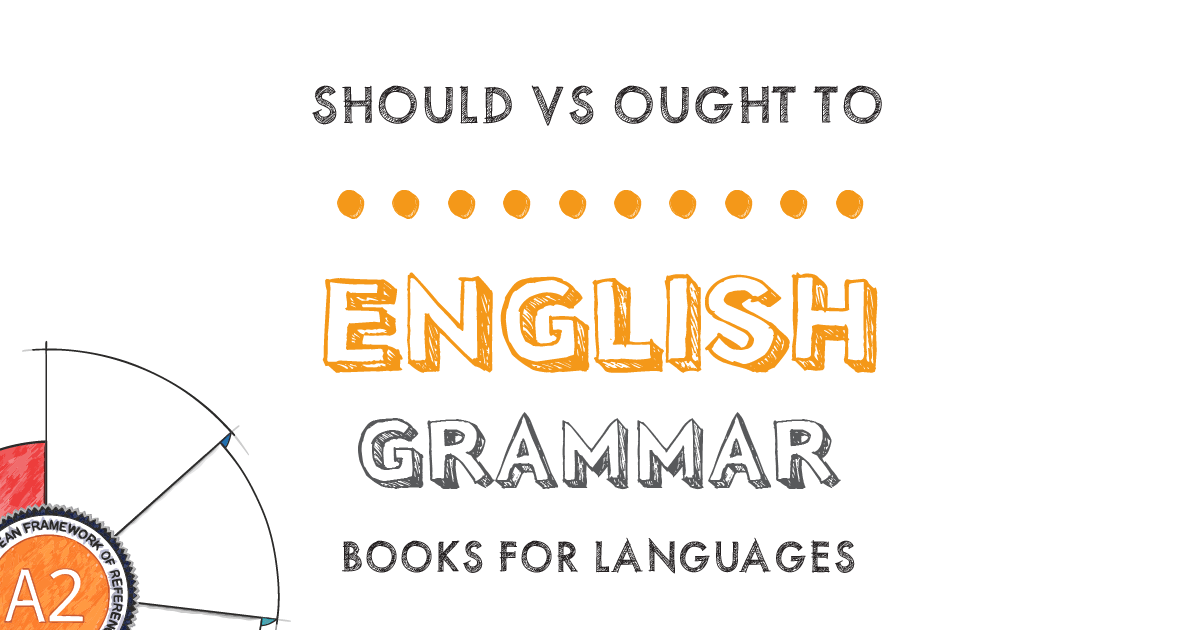
Should Vs Ought To English Grammar Level

Using Should And Ought To Buscar Con Google Educacion Ingles Aprender Ingles Vocabulario En Ingles

English Grammar Academy Facebook
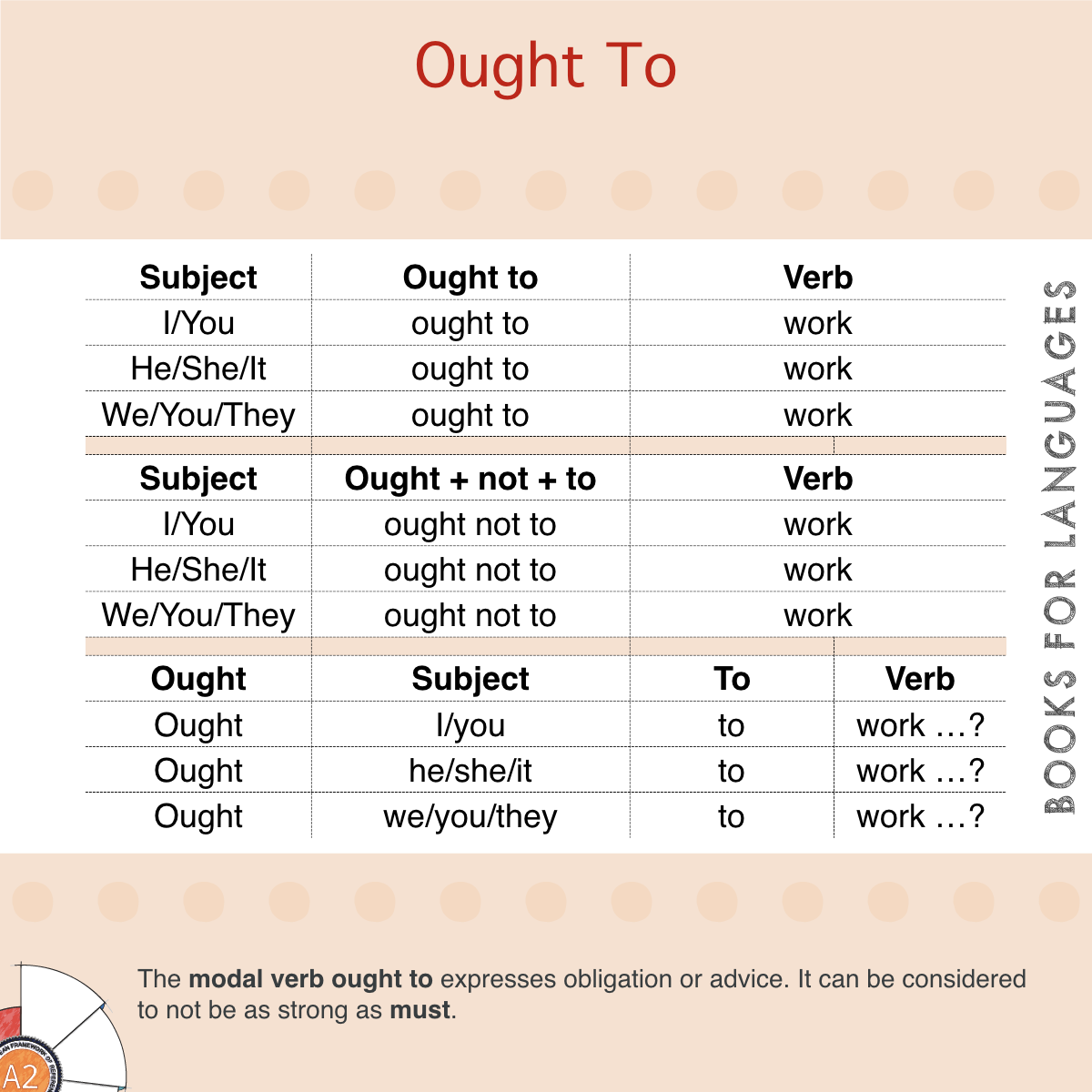
Ought To Modal Auxiliary Verb English Grammar Level




